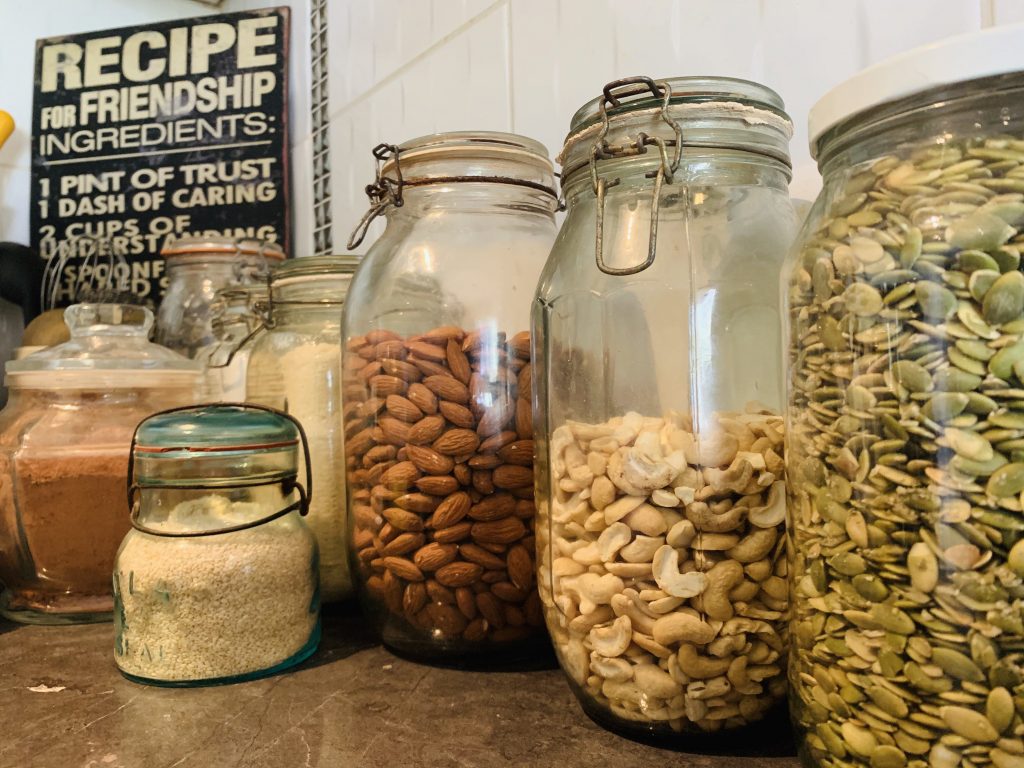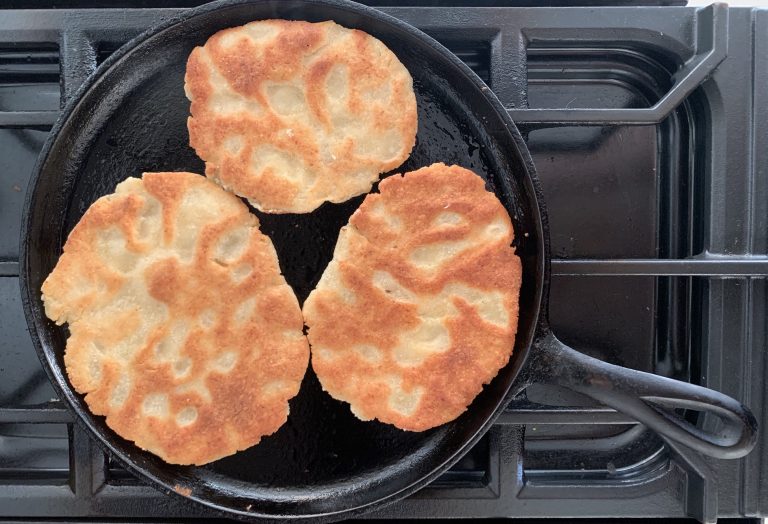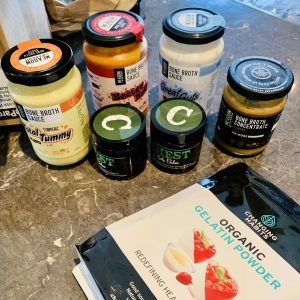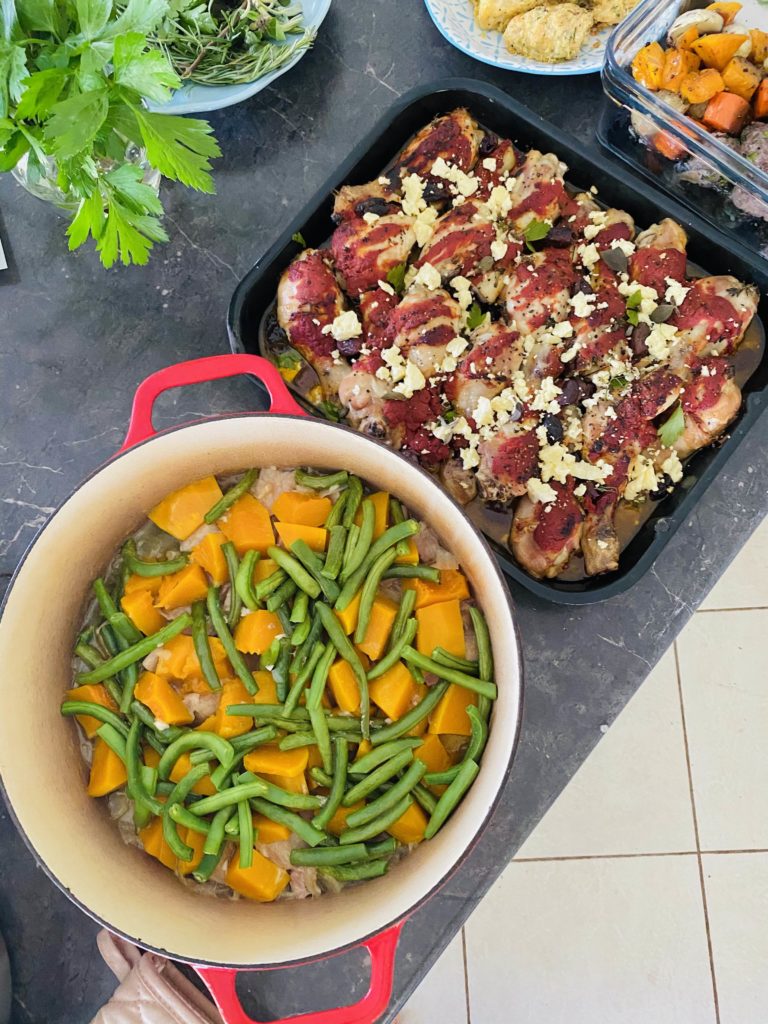No products in the cart.
Breakfasts, Gluten Free, Health, Healthy Living, Meal Plans, Tips, Wholefood
Preparing Your Pantry to “Stay at Home” During COVID-19
Posted on by QuirkyJo

I really didn’t want to write an article about the COVID-19 virus, lockdown, safety precautions, and pantry prepping. I would much rather ignore it all and hide away in my quiet home, cooking in my kitchen and drinking cups of tea and pretending it’s not happening. But reality has hit here in Australia, even in my small country town. I’m really feeling the need to help reduce the overwhelm for those who are used to popping down to the shops anytime, and suddenly have to stay home (maybe with kids bouncing off the walls and wanting to eat constantly)… And also for those who are not used to buying whole foods online, or making up meals using what they have on hand.
I’ve been buying pantry ingredients online for about 20 years now – usually through whole food co-ops and bulk buying websites – and it has not only saved me a lot of money but also greatly reduced the need to be always dashing to the shops! (See this article I wrote on Bulk Food Buying & Co-ops – March, 2011.) I’ve gone through stages of meal-planning and shopping once a fortnight or once a month, and I often challenge myself to make meals from the pantry and freezer to use up what I’ve got! (See my “Using up what I’ve got” videos on IGTV and Facebook.)
Bulk buying is not about hoarding supplies. It’s about knowing how to order online, what to look for, and how to reduce your trips out to buy food. Even a kilo or two of the main food groups below will keep you going for a while, and will help you not to stress over supplies while in lockdown.
My friend Greti (a well-loved member of my Quirky Cooking Chat Group) sent me an email explaining what life is like in California under orders to stay at home. She shared her list of what she keeps in her pantry and home, and I’ve adapted it for Australian readers and added some of my own tips for you. We hope you find it helpful.
Greti says, “Here in the Silicon Valley/San Francisco Bay Area we were ordered into a Shelter-in-Place order last week. This will hold for the foreseeable future, it might be a couple of weeks or several months, depending on how well we are able to manage the outbreak. I come from a background of software quality assurance in healthcare applications, so I knew to be prepared, without panicking. This has paid off big-time as we see many around us lose their heads emptying out store shelves of things like water and toilet paper. I thought I’d share what I have done to be prepared to hunker down long-term if this should be the case.”
This is not something either of us ever imagined writing about, but it is something we both feel prepared for. We hope our tips will be helpful to you, and we especially hope and pray you all stay safe and well.
Keep in touch via my Quirky Cooking Chat Group, Instagram, and the Quirky Cooking FB page. I’ll keep posting cooking videos, health tips, and recipe ideas in my Insta and FB stories, and I’m happy to answer any questions you have – message me there and I’ll get back to you as soon as possible.
All the best, Jo & Greti xx

What it means to "Stay at Home"...
Throughout the world, people are being advised to “stay at home” to prevent the spread of the COVID-19 virus. In most states of Australia all businesses except ‘essential’ businesses (hospitals, doctor’s offices, banks, and grocery stores) are now closed to the public, and we are advised not to leave our houses except for essential outings. Travel is restricted, restaurants and cafes are only open for takeaway or deliveries, schools are closing in most states, gyms and churches are closed, all events are cancelled. If we do have to go out we are told to stay 1.5m away from any person we do not live with, wear disposable gloves to fill up the fuel tank of the car, avoid touching surfaces (and if we do, wash our hands or disinfect them), disinfect the inside of the car and door handles and door knobs every time we have been out in public, have a shower immediately we get home and wash clothes in hot water or hang in the sun… It can all feel quite overwhelming.
For a time, this will be our new norm. We just have to remind ourselves it’s not forever, we still have plenty of food available to us, we have the internet to keep in touch with each other (thank goodness!!), and we just have to reduce physical contact for a while until the spread of the virus is halted. We can do this!!
I love Leslie of the MINDD Foundation's comment that we should call it 'physical distancing' not 'social distancing', because we can still have social contact via video calls, phone & internet - let's be thankful for that!
Jo, Quirky Cooking Tweet
Planning & Preparing...
NOTE: The guidelines here are for a gluten free, whole food diet, so we haven’t mentioned packaged convenience foods, cans, flours, wheat breads/pastas, etc. However, this is an exceptional situation and having food to keep on going means it won’t always be perfect, and we may have to do the best we can with what is available. If you have a more specialised diet, stock up on your necessary staples, and if you have health issues talk to your nutritionist/naturopath/GAPS practitioner about what to order, as well as any supplements to have on hand.
- Take an inventory of your food supplies. If you generally eat a whole food diet and are used to cooking from scratch, you probably already have a well stocked pantry and freezer. It’s important to keep it well organised so you don’t randomly shop for things you don’t need, or forget to order things you do need. Clean out the pantry, consolidate packets into jars, know what you’ve got. Clean out your freezer, reorganise and list what’s in there. Place older items to front/top and newer items to back/bottom, so food isn’t wasted.
- Make sure you have non-perishables that would allow you to go several weeks without having to shop. If infections soar, you need to be prepared to shop less and less, because every outing (and even every delivery) means possible points of infection. The more solid a stash of non-perishables you have at home, the less exposed you’d be.
- Ordering pantry items online can be slow right now – here’s a quicker way! I’ve seen notices on websites saying online ordering can take up to 2 weeks just for the order to be processed! So I contacted Source Bulk Foods and they said we can order directly through their local stores. I did, and my order was sent within two days! (I asked about stock levels and they said they have plenty in their main warehouse, so there’s no problem with filling orders. Yay!!) To order this way, go to the Source Bulk Foods website, write down what you want (including the SKU code number for each item), then send your local store an email with your order (amount in kgs, name of item, & code no). They will call you to take payment over the phone and to give you the box weight/dimensions, then you can book a courier to pick it up and deliver to your door. You can probably do the same with any local whole food store, so give them a call and check into it. This is what I have found to be the easiest and quickest option for online ordering.
- Order from my Quirky Cooking Online Store. The Quirky store does have quite a few staples and we will be adding more as we can. These include coconut oil, gelatine, camu camu powder (natural Vit C supplement), nut & hemp seed milk bases (1 jar makes 10 litres of milk), bone broth concentrates (1 jar makes 26 cups broth), bone broth sauces and mayo, Aussie salt & pepper, healthy chocolate hazelnut spread, natural healing balms (including a chest balm which is a natural replacement for Vicks)… plus cookbooks and lots more. Worth a look!! Check out the entire store here.

I order pantry ingredients through my local Source Bulk Foods store by emailing in my order and having it delivered. Simple, much quicker than ordering online, and I'm supporting a local business.
Jo, Quirky Cooking Tweet
Food Items to Have on Hand...
BEANS and LENTILS: Chana dal, French lentils, black lentils, red lentils, chickpeas, black beans, kidney beans, cannellini beans… The type is not important, just have a variety for different dishes, and to bulk out meals. These are good sources of protein and can be stored in jars on the benchtop. Prepare them according to these guidelines, for maximum digestibility and nutrition.
PASTA: Pasta is one of the things that first went missing from our supermarket shelves, but here’s a couple of alternative options you may find are still available: lentil/legume pastas and kelp noodles (in the health food section of store & health food shops), and mung bean vermicelli/rice noodles (in the Asian food section of stores and Asian grocery stores). You can also buy buckwheat flour or groats and make your own buckwheat pasta – it’s super simple! (Step by step instructions with photos here.)
HEALTHY FATS: Extra virgin coconut oil (recommended for fighting off viruses as it is antiviral, antifungal and antibacterial!), extra virgin olive oil (I order Australian olive oil in bulk online and have it delivered), butter (fridge/freezer), ghee (shelf stable) – those are the main fats/oils we use. If you can’t find butter/ghee but you can get pure pouring cream, make your own butter with this recipe, (just to step 5 if you want pure butter), then make ghee from the pure butter if you want ghee. I also have plenty of beef fat in my freezer from buying bulk grass-fed beef, and I use that to make tallow. Tallow is not only useful for cooking, but also for seasoning iron pans and for making homemade soap!
NUTS/SEEDS: I always buy nuts and seeds in bulk, then store in the freezer. If I activate them (soak and dehydrate) I do a lot at once, then keep some in jars on the benchtop and the rest in the freezer. My most used nuts/seeds are whole almonds, blanched almond meal, pepitas, macadamia nuts and raw cashews. If available I like to also have a small amount of sunflower seeds, walnuts, pecans, and hazelnuts on hand. (I don’t recommend buying the last three out of season as they seem to go rancid quickly due to high oil content.) In the current situation, even a kg each of the ones you use most will be very helpful!
CACAO: Cacao powder, cacao butter, and even cacao wafers if you use them. If you make your own healthy treats (chocolate is an essential, right??)), you want to have those.
COCONUT: I’ve mentioned coconut oil already. You may like to also order coconut flour and coconut cream (I never buy milk, I just thin out the coconut cream with water to make milk), or desiccated/shredded coconut if you want to make your own cream/milk.
SPICES: Who would have thought in a pandemic you’d have to worry about spices? Well, many people are finding it difficult to buy garlic, ginger and turmeric as they are top of the list for enhancing the immune system, so if you can get some good quality dried garlic, turmeric and ginger online, do it! (It’s a good idea to order all the spices you generally use if you are running low, but especially those three.)
MUSHROOM POWDERS: If you want an extra boost for your immune system, get some Asian mushrooms in powder form (maitake, shitake, enotake, etc), mix them with salt and use that mushroom salt with your food. You get an immediate boost in your everyday meals.
STOCKS & BROTHS: If you have enough freezer space, get some beef/lamb bones & chicken carcasses/feet. If you don’t, you can order bone broth concentrate in our online store, here. Broths and stocks add nourishment to meals, and help to improve gut health, which in turn improves your immune system. For tips on making your own stocks and broths, see this article.
FERMENTS: For optimal immune function, you ideally want to ingest a trilogy of ferment types each day if you can: vegetable ferments (KRAUT/KIMCH), MILK KEFIR (dairy kefir or kefir made from nut/seed/coconut milk) and KOMBUCHA. Don’t stress if you can’t do all three, but add what you can into your daily diet. Even a little bit of one is better than nothing. You can very simply make your own sauerkraut (video here) and fire cider (video here). That’s a good start! Also, we recommend these kefir grains for milk kefir. Kraut is a longer term ferment (weeks), kombucha is about a week to 10 days, and kefir you can make daily. So if you want to make your own kraut and veggie ferments, START NOW. Have enough bulk tea to make kombucha. Buy some kefir grains. Try some simple ferments like garlic and honey. Don’t stress about doing it all, just begin somewhere.
RICE: (If you eat it.) If you are worried about blood glucose, get organic brown basmati rice – it has a medium GI to start with, but if you cook it, cool it and then make a dish with it the next day, it will have a lowered GI. Greti likes to cook rice with chana dal (split baby chickpeas). Chickpeas are very low GI and help to lower the GI of the rice. She suggest 1/2 brown basmati, 1/2 chana dal (precooked and refrigerated overnight), then sauté them with lots of veggies, fat, and eggs, and top with cheese for a quick satisfying meal that can give you leftovers for days!
MEATS and FISH: Buy in bulk if you can, and freeze.
FROZEN VEGETABLES: These are getting harder to find, because people are worried fresh vegetables will run out. (They won’t, but if you want some frozen veg to make life easier, you’d better get some soon.) If you’re worried your fresh veg supply might have temporary shortages, you can freeze some fresh veggies now (especially the hardy kind like cauliflower, Brussel sprouts, celery, onions, green beans etc) – wash and cut/slice them and freeze in bags for later use. You can also freeze fresh herbs, spring onions, minced ginger/garlic/turmeric, and lots more.
CANNED FOODS: Get jarred or canned items of your commonly used foods, like tomato sauce, tomato paste, passata sauce, tinned tomatoes, olives, tuna/mackeral.
SALT & PEPPER: Buy in bags from health food stores (or buy from my online store). Lots of people are doing nasal rinses so salt supplies in some areas is depleted.
BICARB SODA: A packet or two of bicarb soda is handy, as you can use it not only for baking, but also for nasal rinses. If you think you will want to do these, make up a jar ahead of time (3 parts salt to 1 part bicarb), blend in Thermie, put in a jar, then use one small teaspoon per neti pot rinse. It will save you valuable time later.

Infection Prevention Items...
The following items may also be useful if your community has many COVID-19 cases, as the chances of infection from fomites (surfaces that can carry the virus) is high.
GLOVES: Try to get biodegradable food handling gloves, and/or get a few pairs of cotton cleaning/gardening gloves (online or from supermarket/hardware stores) as these can be washed and reused. If there is concern about an outbreak in your community, you may want to wear gloves if you go to the shops, then just take them off and place in a bin if they are disposable, or place cotton gloves into a bag to be taken home and washed before getting back into your car. Gloves, especially coloured ones, can also be a good way for you to learn to stop touching your face – seeing a purple glove come at your eyes might remind you to stop. 😉
MASKS: Do you need to wear a face mask when you go out? Not if you are out in the fresh air and not close to other people, but if you need to wear a mask look for washable cloth masks so you don’t contribute to the huge amount of masks now going to landfill.
HAND SANITISER (or 70-99% ISOPROPYL ALCOHOL, ALOE VERA GEL and ESSENTIAL OILS): This virus is killed by pure alcohol, so 99% isopropyl alcohol works well if you can’t get hand sanitiser. There are lots of recipes online for making hand sanitiser – basically it’s ¾ rubbing alcohol, ¼ aloe vera, and some essential oils. Please be aware, if you make your own hand sanitiser it has to be AT LEAST 70% alcohol in the final product to be effective against viruses. So, if you mix the alcohol with other ingredients like aloe vera, it will dilute the percentage of alcohol in your final recipe. You NEED the aloe vera if you make your own sanitiser, don’t try it without. Alcohol is very harsh on your hands and you would injure them, defeating the purpose of protecting yourself. Do the math on your recipe.
Greti suggests adding lavender EO to hand sanitiser to make it smooth and nourishing. Lavender is also an antiviral. Please be aware that lavender is one of the very very very few essential oils you can directly apply to your skin without hurting it.
SMALL, CONVENIENT BOTTLES: Handy for your homemade hand sanitiser. Washing and sanitising hands is one of the best ways to avoid infection. General rule for safety: one sanitiser for your purse, one in your car, one at work, at least one bottle inside the house (if you have visitors, you might want to have one in each room). The same goes for husband (one at work, in the car, in a briefcase, etc) and the kids if they are going out alone. Greti suggests buying some TSA flight-approved silicone containers if you can’t find small enough bottles.
DIFFUSERS: For essential oils. If you still go to work or have people visit, a diffuser filled with essential oils that are antiviral (or have shown action against flu and cold viruses) might not be a bad idea. We don’t have enough data on COVID-19 yet to know how much these help, but having essential oils diffused is generally considered safe and healthy when used correctly.
ANTIVIRAL WIPES: If you can get them. They are good for wiping surfaces in your house and car that might have had virus transfer.
SOAP: Get a supply of hand soap that will last with repeated hand washing for about a month. Washing your hands for 20 seconds with soap (properly, like this) is one the best ways to prevent virus spread. Cold water is OK, but warm/hotter water is more effective. The recommendation from health authorities is to wet your hands, add soap and then vigorously rub, on the back of your hands, your palms, in between all the fingers, do the fingers and then the nails. Then rinse off.
Tips for Receiving Deliveries Safely During Pandemic...
From Greti…
As you know, the virus survives different times on different surfaces. New data comes out almost daily. What we know now is that smooth surfaces (like plastic) and steel seem to keep it the longest (but that also depends on other factors like temperature, and which smooth materials – on copper it apparently survives less long). On surfaces like cardboard, the virus is thought to survive from only a few hours to up to a day. The key here: do not panic. The likelihood of infection from a delivery is still small. But it is not non-existent which is why we are told to follow certain precautions.
- Get all your deliveries inside the house once a day only, if that is practical. If you have two people doing it, it makes it easier, but one can do it just fine.
- We put on gloves when we do this, but you can do it with your bare hands, no problem, you just need to be aware not to touch your door or any surface inside your house until you have washed your hands for 20 seconds. (See Hand Washing Tips below.)
- Open all your packages first (if there was contamination, it’s most likely on the outside of the package and the many hands that touched it). Once all are open, use a ‘clean’ hand, or second person, or glove off and bare hands, and get out whatever is in the package.
- Put all goods into your own shopping bags to bring inside the house or hand it to someone inside the house. Dispose of packaging outside the house, don’t bring it inside.
If you have sick or elderly people in your house and already widespread community infections, you might take a few extra steps:
- If what you ordered is wrapped in something else (eg. plastic bag), you might want to wipe that down with an antiviral wipe or spray it with isopropyl alcohol (70-99%), just to be extra safe.
- We do have community spread here in San Francisco, so we wash all produce when it comes in, then dry and put in fridge. Otherwise make sure they are cooked before eating.
Remember, the chances of picking this virus up from a package are small, but not nil, which is why measures are recommended. But keep them in perspective and don’t stress over them. You are doing the best you can, and staying calm and having a feeling of safety inside your house are paramount and will help keep your immune system in the best shape it can be. Don’t look at these steps as ‘forbidding’ but as a health-enhancing measure. Just like you cook from scratch for long-term health, right now, you wash your hands and disinfect for long-term health. Stay safe everyone!”
General Tips...
HAND WASHING TIPS: (from an infectious disease specialist who works with Covid19 patients.) Follow everything you’ve been taught – wet hands, lather with soap, backs of hands, palms, each finger and then the nails for a total of at least 20 seconds – but add this: the key is FRICTION. The harder you scrub the more effective. Be aware of your hand’s health though. If you wash many many times a day, make sure you take care of them so they don’t chafe.
MEDICATIONS & SUPPLEMENTS: Check your stocks of medications and supplements needed for all your family members and pets. (Ask your practitioners for advice on this.) Organise with your pharmacy to have medications delivered rather than pick them up.
SHOPPING LOCALLY: In this pandemic, leaving the house to shop furthers virus spread. We want to find ways to support our local stores, so check if they have online shopping options, or if they can deliver after you phone in your order. Many small shops and cafes/restaurants have diverted their employees to driving deliveries to their customers and doing no-contact drop-offs on doorsteps followed by a phone call to the customer that their order is outside. Many cafes and restaurants are also setting up drive thrus. Call your favourite shops/cafes/restaurants and ask them what options they have in place, and keep supporting them as much as possible so they can keep their business afloat in this crisis.
GROCERY DELIVERY: Set up an account with your local grocery store and familiarise yourself with their terms. This is one of the most important things you can do in this crisis. Perishable groceries are something you can’t stock up on too much in advance. The best way to protect yourself (other than growing your own food!) is to find stores that deliver. If your local store doesn’t offer an online ordering option, ask if they will consider taking call-in orders, charge your credit card, and have an employee drop off the items at your door. Everyone stays safe. If your local shops can’t or don’t want to offer that choice, look up food and grocery delivery apps.
FOOD AND GROCERY DELIVERY APPS and see if they can deliver to your area. Greti says, “I have been doing online grocery shopping (from stores and a few from delivery apps) exclusively for 4 weeks and we have been well supplied. Look at the terms the apps have. Some charge steep delivery fees.”
ONLINE SHOPPING ACCOUNTS: Check out online stores for things you use regularly, and set up an account. If your supply chains are running dry, stores will be out of goods first, then online retailers. In this crisis, shopping online actually helps curb virus spread. It keeps people at home, keeps employees much safer (no more contact with the public). Also, warehouse workers are spaced farther apart from each other, making them safer.
MEDICAL APPOINTMENTS: Call your doctor’s office and see if they will be staying open during a lock-down (not all do) and how to get in touch with the doctor if you have an emergency. Health experts in Europe and the US in affected areas are telling vulnerable populations not to go to ERs unless absolutely necessary as viral transmission there is more likely, so get any non-essential testing and visits done now.
TOILET PAPER: As we are all aware, TP is like gold these days. So if you can’t get any TP but you can get PAPER TOWELS, you could make some homemade wipes. BUT DO NOT FLUSH THEM! Another option is buying a stack of cloth nappies or cheap wash cloths plus a lidded nappy bucket or two, and wash like this. (I’d probably dispose of any really gross cloths, but as my son Isaac says, “Mum if everyone just eats healthy they’ll have firm poos and won’t need to wipe much!” LOL!)
FLU & COLD REMEDIES: Have your usual home remedies, supplements like zinc and Kakadu plum powder, natural lozenges, elderberries, etc on hand if you can, as they will become more difficult to source. If you get symptoms, it could *just* be a cold or a flu and you’d want to have your regular home remedies. (Note from Greti: Elderberries are a great addition to the second ferment of kombucha for a flu and virus fighting boost!)
ESSENTIAL OILS: Stock up on the ones with antiviral properties. Talk to your EO rep or a knowledgeable store on which ones to get. I have been using DoTerra oils for years and love them, but there are some other great brands out there as well. Just make sure you use them carefully – diffusers are safest, do not ingest drops of oils in water, always use a carrier oil if rubbing on skin.
PET FOOD: If your pet is on a raw, BARF diet, you might rightfully be worried about being able to get that through this crisis. Investigate now if there are healthy dried alternatives. Greti found a dried food that was freeze-dried with the same ingredients as the BARF diet. Not as good as the fresh BARF, but in a survival situation, a great alternative. Lay in a stash now.
Some Final Notes...
If you have a trusted healthcare provider, go online and look at their advice on precautions and how to keep your immune system healthy. We will share podcasts and updates from our trusted practitioners as we can.
Share what you have learned in a calm, low-stress way with your family. Talk through a plan for how you will do everyday tasks, the steps needed to stay safe if you have to go out, how you will keep in touch with family and friends, etc, so the whole family are on board and working together to keep each other safe.
If you are anxious or start to feel lonely and depressed, please talk to someone. Call friends and family and have a chat. Or contact an online counselling service like Beyond Blue, a local church, or other charities that offer counselling.
Take care of each other, and look for the positives each day. I hope this enforced time at home will help us all to really slow down, reduce the ‘busyness’, and focus on what is really important. Stay in touch with your family, friends, neighbours and the Quirky community – we need each other during this time of crisis.
All the best! xx


Great article, many thanks Jo and Greti.
Small thing, but cutting cakes of soap into smaller pieces will make your soap go further.
Cheers and best wishes
Thank you:-)
Your posts is great. I follow you regularly.I recommend your website to everyone. Thanks
Thank you so much:-)
Hi…thanks for the recipes..just going to churn some butter…and especially now for the very practicable timely advice to see us all through this difficult time.
All the best to you and yours, Graeme
Thanks Graeme. All the best to you too!
Great recipes!
When I tried this recipe it really helped during the pandemic. Thanks for the recipe.